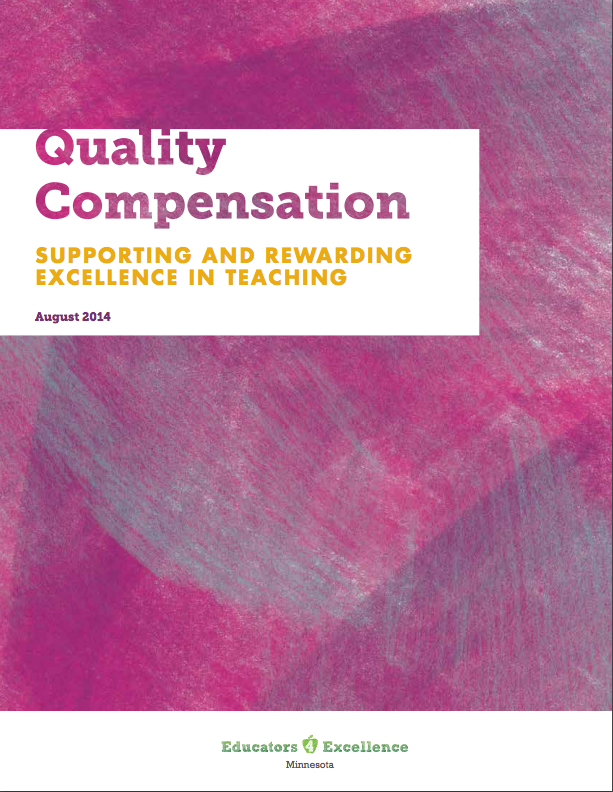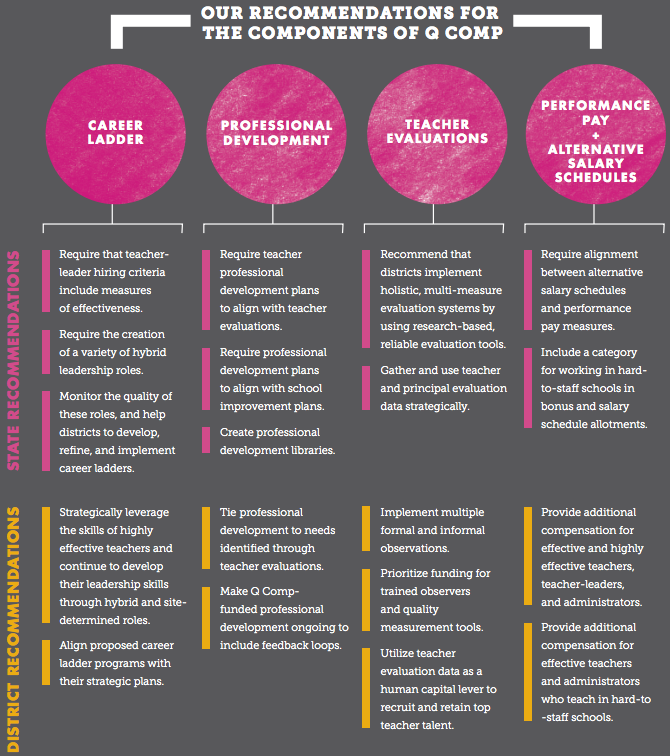
Quality Compensation
Supporting and rewarding excellence in teaching
August 2014

In 2005, Minnesota passed the Quality Compensation law (known as Q Comp), an optional statewide program that provides additional funding to districts or public charter schools to support them in designing alternative teacher compensation and professional development systems. While there is evidence that Q Comp has had a positive impact on student outcomes, there is still room to strengthen it.
As teachers, we feel it is our duty to reflect upon and study ways to improve our practice to better drive student achievement. This is what sparked our interest in Q Comp, since the program includes money for job-embedded professional development, encourages time for collaboration and offers a system of supports for teachers to improve their craft. It also financially rewards teachers who meet locally determined goals. We support these ideas in principle, but wanted to look at the evidence about Q Comp—both what teachers thought of the program and what the research showed.
Recommendations:
-
Develop career ladders with hybrid teacher-leader roles for effective teachers and monitor the impact of leadership roles;
-
Implement ongoing, job-embedded professional development aligned with teacher evaluation data.
-
Implement a multi-measured teacher evaluation system that leverages human capital to attract and retain top teacher talent.
- Align alternate salary schedules and performance pay measures, create incentives for effective teachers at hard-to-staff schools and provide additional compensation for effective and highly effective teachers.

About the Teacher Action Team
We are a team of 14 educators who met over the course of eight weeks to review research on compensation, teacher evaluation, and career ladder programs across the nation. We conducted interviews with district leaders, colleagues, and Minnesota Department of Education staff to gather critical information about current practices and stakeholder feedback. We also conducted focus groups and surveyed colleagues to develop the team’s final recommendations.
Maggie Borman 3rd-grade Teacher at Best Academy
Jen Bowman 7th-grade Science Teacher at FAIR School–Crystal
Kallie Fitzloff Kindergarten Teacher at Mastery School
Natalie Jones 2nd-grade Teacher at Community School of Excellence
Elliot Kohl 1st-grade Teacher at College Prep Elementary
Holly Kragthorpe 7th-grade Social Studies Teacher at Ramsey Middle School
Maya Kruger Middle School Science Teacher at Loveworks Academy
Carlos León Math Specialist Teacher at Green Central Park Elementary
Kaitlin Lindsey English Language Learner Teacher at Anne Sullivan Elementary
Lisa Putz Kindergarten Teacher at Higher Ground Academy
Taylor Rub Special Education Teacher at Bright Water Montessori School
Kristina Sexe 1st- and 2nd-grade Teacher at Armatage Montessori School
Soraya Valedon Lopez 1st-grade Teacher at Anderson United Community School
Luke Winspur High School Geometry and Precalculus Teacher at FAIR School– Downtown